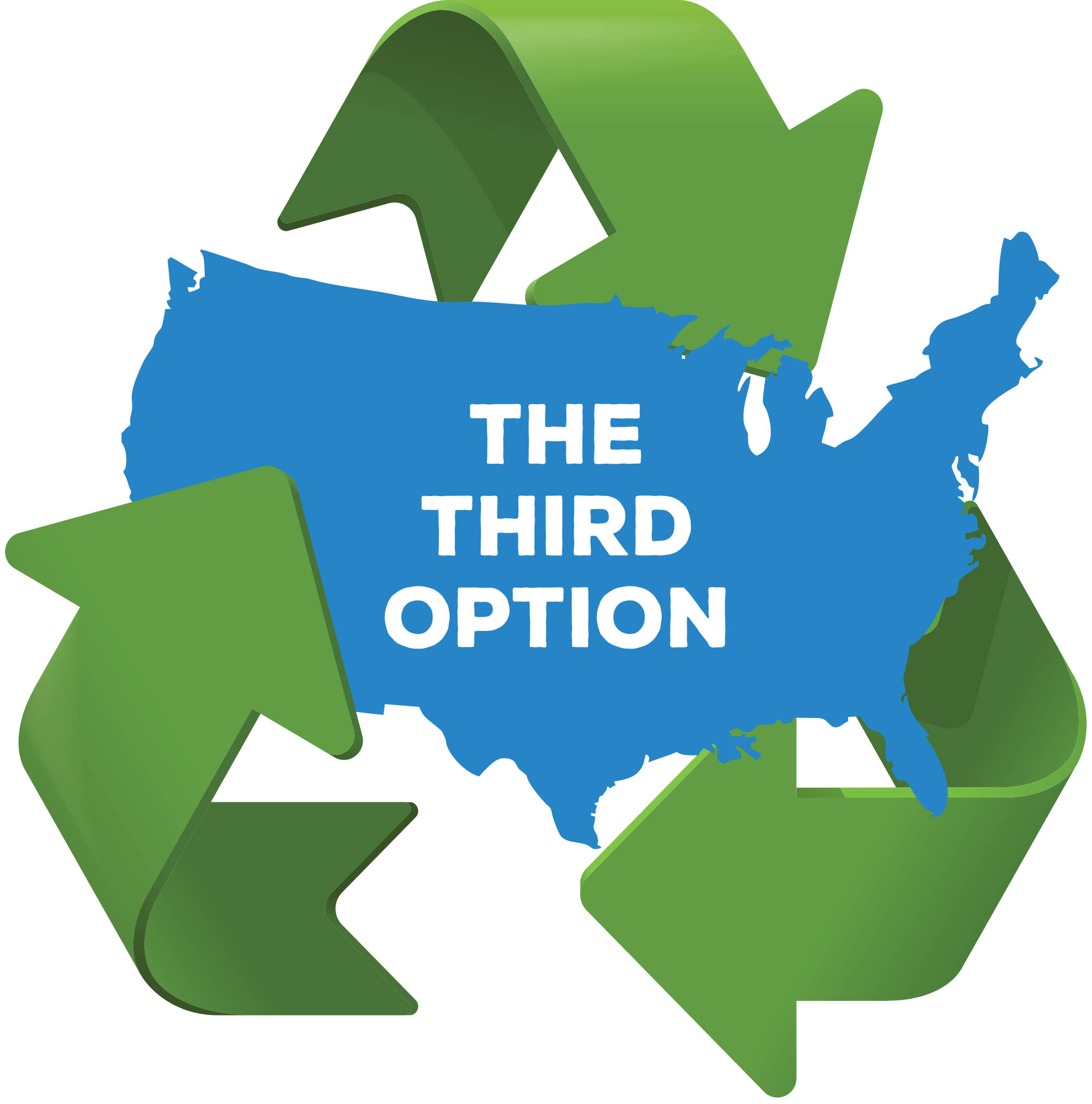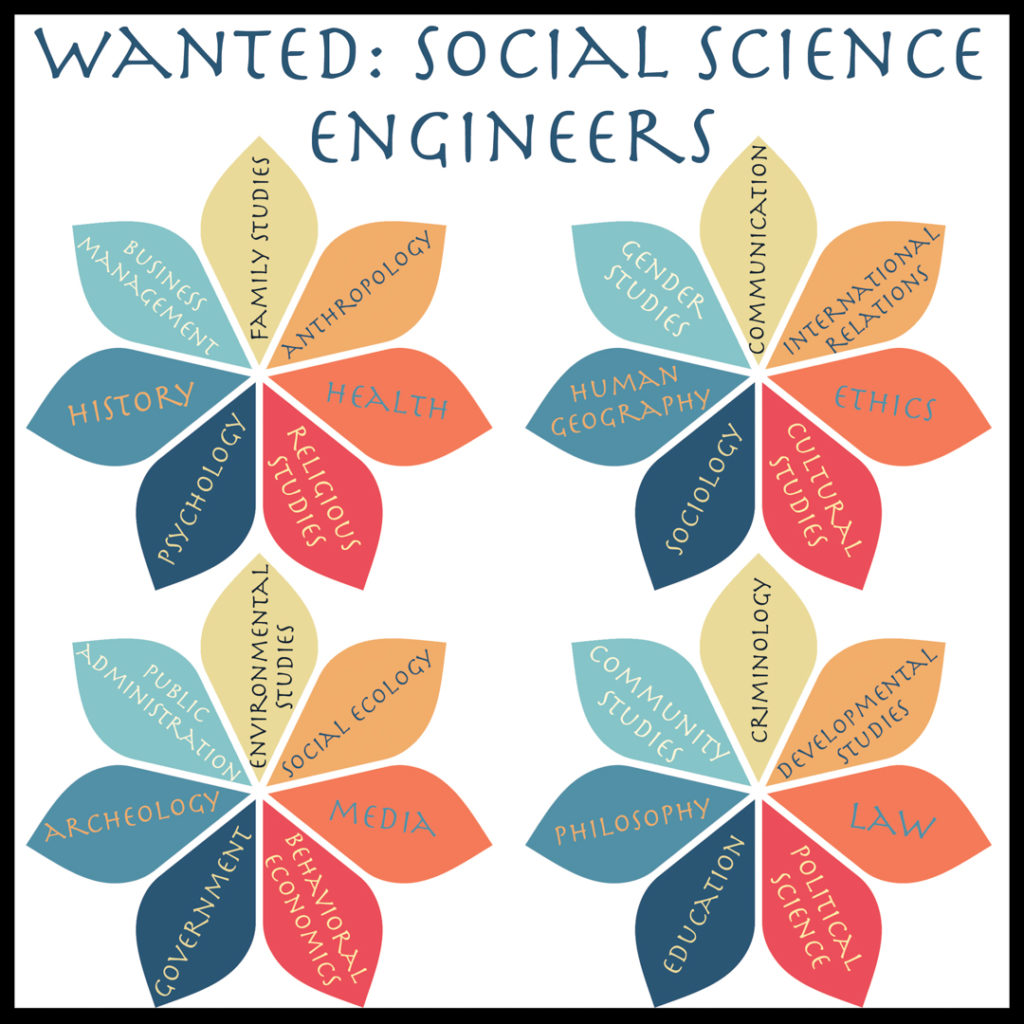
Dear Social Scientists: in Capitalism’s version of Democracy, Social Science ‘stock’ has gone down in value because the people it studies have slowly done the same. In Democracy’s version of Capitalism, the value of both rises significantly.
Join The Third Option in recognizing Economics as an ‘applied Social Science’, then begin postulating your own Unified Theory of Economic Democracy, backed by the full weight of Social Science research, in order to present this alternate theory of Democratic Capitalism for public consideration.
In the meantime, The Third Option is offering its own Theory of Economic Democracy for your consideration. Read our Open Letter to Economists for all the details.
Table of contents
The Philosophical Argument
Democracy does not require perfect equality, but it does require that citizens share in a common life.
Michael Sandel
Democracy is the Power of each person to freely choose their version of the ‘good life’, and while they may empower others, they may only exert Control over themselves. The ‘common life’ we share needs to be free from Uncertainty, Unfairness, and Isolation, and full of opportunity, support, safety, security, belonging…all the things that facilitate human happiness. It is for this reason that The Third Option offers up Democracy’s version of Capitalism for philosophical review, where Democracy – which champions each person’s search for meaning, fulfillment, and happiness – is allowed to set the framework in which Capitalism can operate, so it becomes a source of self-actualization, not self-destruction.
The Logic Argument
In most of our lives, we are accustomed to aiming at mastery and control and dominion – over nature, over our lives, over our jobs, over our careers, over the goods that we buy.
Michael Sandel
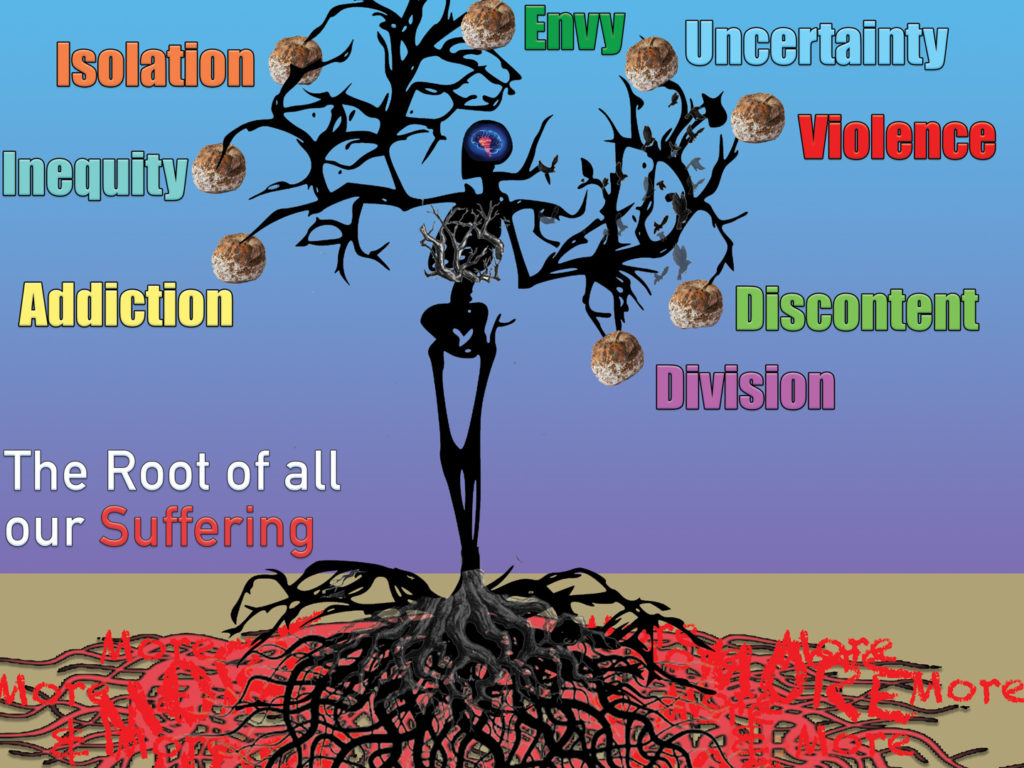
Capitalism is profit-driven, meaning it is money-driven, which means money is the measure of value in the reality we have established. This means that people would logically have greater value when they possess greater amounts of money. It is logical that more money would buy someone more influence – votes or free speech or political candidates. It would buy access to more credit or investment capital. With more money in the pot, it would be easier to force small business to ‘fold’. It is logical that they would grow ‘too big to fail’ – that the institution of government, which chose not to diversify their portfolio but ‘bet the farm’ on Capitalism, would be forced to keep those with money from failing, or they would take all of us down with them, and open us up to the enemies we have created by ‘protecting our interest abroad’ and carving out ‘our spheres of influence’.
If the American people truly understood this, they would also be forced to conclude that negative externalities like wealth inequality, mass migration, war, pollution, incarceration, addiction, poor health outcomes, unstable family dynamics, environmental racism, gentrification, food deserts, political polarization, increased suicide, depression, mental illness, etc. are all predictable outcomes of this particular environment, and will continue to persist if we do not alter it to produce more desirable results.
Currently, there are several factions who have individually formed themselves in order to address, quite passionately, one particular negative externality or another, even though each one is directly connected to the others by the simple fact that they all stem from the same root cause. In an environment based on Democracy, these disparate factions would reasonably unite around this common ‘cause’, and strike at the root of their collective suffering, instead of continuing to hack around (in isolation) at the individual branches. In order to strike with great effect, they would first seek to correctly identify the hidden root from which all their trouble sprang forth, which, they would soon discover, is NOT Capitalism, but oppression itself – our singular human drive to Control the uncertain space around us, coupled with the insatiable desire to replicate and consume. In our current economic environment, this presents as economic ‘liberty’ (aka consumerism) – that may enhance ‘happiness’ from a purely human perspective, but has proven to be quite cancerous from all other points-of-view.
Our digging has now unearthed sensitive territory and presents us with the unfortunate realization that these various factions might, in fact, never come together. This ‘environment’ of ‘rational self-interest’, born out of this tradition of oppression, will always bend our minds toward a version of ‘liberty’ no more sophisticated than that of some single isolated sperm, anxiously searching for the place it might ‘fit in’ – an endless exercise in self-propagation. There is no ‘us’ in this version of liberty. There is no ‘Democratic’ solution.
Many of us might even take some measure of pride in our suffering. We might imagine that no one has ever suffered the way we have suffered. We are therefore made unique and special in the suffering Oppression has singly bestowed upon us, so could not possibly lump our suffering together with others; this would trivialize it. Oppression has ripped a hole in us so wide that perhaps it will not be filled in a hundred lifetimes; we demand attention and restitution and absolution, but it never occurs to us that we actually deserve them. Oppression has turned us all into beggars, and beggars can never be choosers.
Look at us; we are clearly instruments similarly fashioned, with built-in strings attached – strings that, on occasion, resonate at the same pitch, and form symphonic movements of equally creative construction and destruction. Perhaps we might yet strike that singular chord of Democracy, and be moved to something greater than the sum or our individual suffering.
Logically speaking, it appears a leap of faith is required here, which by its very nature falls outside the boundaries of mere logic. This is why the Third Option is asking for social scientists to seek interdisciplinary counsel – to lift each other up, and through being greater than the sum of your individual parts, teach the rest of us how Democracy can also make us greater than the sum of our individual parts. Whatever new paradigm your collective efforts devise, make sure it redefines the concept of value in order to look inwardly to find it rather than outwardly. Continuing to covet what we see around us is just another recipe for our continued oppression.
The Anthropological Argument
No person, I think, ever saw a herd of buffalo, of which a few were fat and the great majority lean…Man is the only animal whose desires increase as they are fed; the only animal that is never satisfied.
Henry George
Our tastes are simple: we want MORE and MORE. To seek the MORE from outside ourselves is the root of all human suffering. It is the source of Oppression (aka Control), which is the enemy of Democratic Liberty. Capitalism erroneously built its foundation upon this toxic version of MORE – the un-natural Control of property, the predatory ‘drug’ dealing of every conceivable addiction, and the devaluation of labor when no true value would exist without it.
When we seek the MORE from within ourselves (‘self-mastery’), we enhance our human potential (aka Power). Upon this better foundation, a Democracy could be built, that rewards the effort (labor) that produces value, because without effort, there would be no value, however we choose to measure it.
Economic Growth would now be more solidly rooted in effort, the growth of human efficiency and effectiveness, and the sum of human innovation and achievement, instead of the tip of an iceberg anchored below the surface by the sum of all human deprivation, suffering, depravity, ignorance and oppression.
The Business Management Argument
Budgeting has only one rule: Do not go over budget.
Leslie Tayne
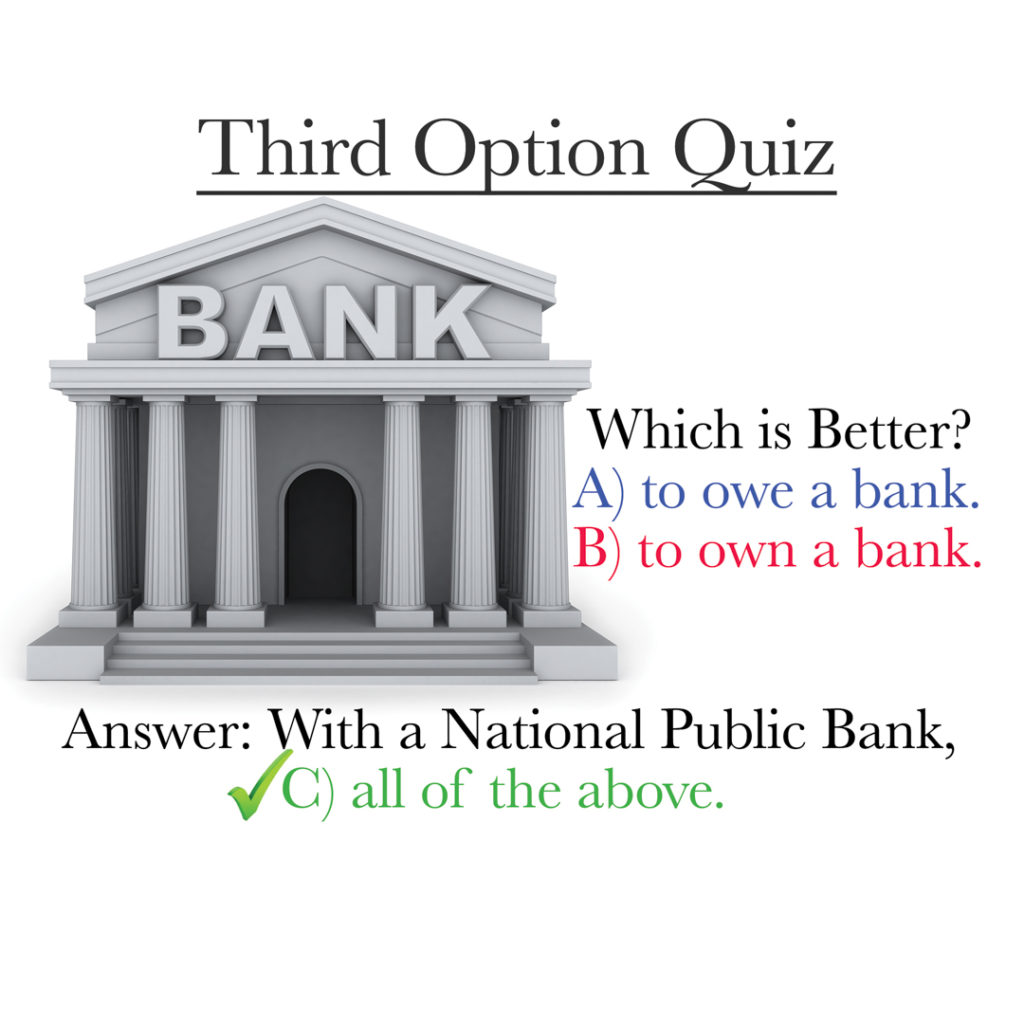
Capitalism operates at a loss; luckily, the loss is currently absorbed by the American taxpayer. We pay for most of our own benefits (social security and Medicare), and incur most of the ‘sunk costs’ for infrastructure, research and development, (energy, health care, agriculture, transportation, etc.), security (home and military abroad), employee training (our own education), as well as corporate welfare, worker disability, unemployment insurance, etc.
Capitalism may not be viable on its own, but in general, businesses themselves can operate ‘in the black’, if they control their operating expenses – salaries and wages, employee benefits, research and development, maintenance and repairs, interest expenses, insurance – so they do not exceed collected revenue. The only difficult part of running a business is getting start-up capital, and if successful, not getting destroyed by bigger businesses looking to poach your business model, and with it, your customers.
In a Democratic version of Capitalism, we would bundle all business growth together – through a National Public Bank that creates and reabsorbs all currency – so when anyone succeeds, we all ultimately succeed. If We the People incorporated, and ran the entire country as a business, we could take our mission statement (to establish Justice, insure domestic Tranquility, promote the general welfare, et al), and devise a business plan around it. Government would become mostly a Bank, and it would ‘bank’ on the rest of us to ‘come up with the goods’, then purchase and consume them. For every contribution we make as innovator, producer, distributor, or consumer, we would get a ‘share’ of the action, through dividends from the National Public Bank. This is all business as usual for large corporations with shareholders. Meanwhile, 90% of whatever each of us produces is ours to keep. Not bad, for getting access to the company’s money, resources, customers, and infrastructure. Only an oppressive dictator would desire any more than that.
We the People would do our own research and development, which we already do anyway, but we would finally listen to ourselves, and implement green energy, electric cars, infinitely recyclable plastic, and DC electricity, for example. Then, if some innovation ever comes along that is clearly better for people or planet, the lesser idea could more easily step aside, knowing that they would ultimately share in this success anyway, as a shareholder in our National Public ‘Investment’ Bank. We could have had the electric car instead of gas-powered ones from the beginning; we could have had direct current (DC) instead of alternating current (AC) as well. Most big decisions have never come down to whether they were the best choice, only the one which had the most political backing.
Big business is currently absorbing small business. Of course, this makes sense, because big businesses can deliver their products more cheaply. The idea that we should sleep better because some billionaire owns the country instead of the public is ridiculous. Having a CEO skim money off the top of a business just to avoid having to pay its fair share of taxes is no longer acceptable. Instead of a political vote, people should be clamoring for a financial shareholder vote.
The time is coming soon where we must demote Capitalism from the CEO position at The United States, Inc., and put a board of shareholders in its place – 330 million of them.
The Socio-Ecological Perspective
To deliberate well about the common good requires…a sense of belonging, a concern for the whole, a moral bond with the community whose fate is at stake.
Michael Sandel, on the need for ‘civic virtue’
Socio-ecological models, that describe individuals within the societal, communal, and relational environments they inhabit, are all on the right track, but will need to wait for the right train, because our current environment is not going to change. Capitalism’s version of Democracy affects underserved communities negatively, which wears on relationships, and breaks down the defenses of the individual, who ultimately must take the heat in Capitalism’s ass-backward version of Justice, designed to ensure Capitalism escapes indictment for one more day.
In Democracy’s version of Capitalism, Democracy is on the front end, which means Justice is on the front end as well, in all its many forms: Environmental, Social, Ecological, Educational – and what Democracy demands is not something controlling, or regulating, or taxing, but simply to create an environment for the success of the individual, per what Democracy promises, but can never achieve with a reactive back-end band-aid fix.
The Ethics Argument
Toleration and freedom and fairness are values too, and they can hardly be defended by the claim that no values can be defended. So it is a mistake to affirm…that all values are merely subjective.
Michael Sandel, Democracy’s Discontent
Truth, by Democracy’s definition, must hold true for every person, which narrows Truth down to our most essential human needs, then expands outward to facilitate ‘growth needs’, up to the point that they infringe upon the liberty of others. It is from this short list that a Democratic framework can be constructed, that fosters a relational version of Democratic Equality, and delivers ‘reciprocal obligations’ that Capitalism’s version of Democracy has been unable to successfully enforce, when marketed as ‘unalienable rights’. Once people are properly fed, clothed, and housed, and empowered to follow their passion, they will be more agreeable to the civic duty of self-government that Democracy requires in an ethically-infused environment.
The History Argument
Unless there be correct thought, there cannot be any action, and when there is correct thought, right action will follow.
Henry George
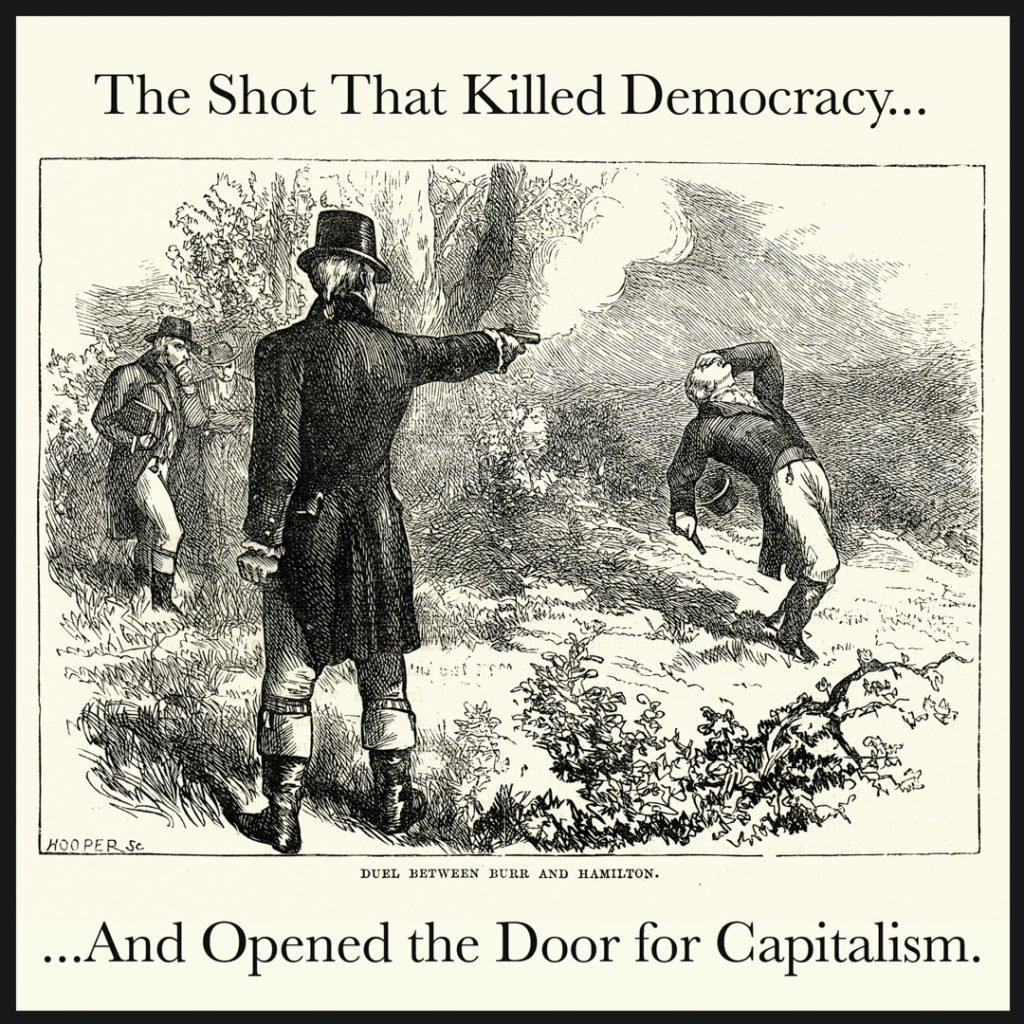
History repeats itself because we continually fail to factor our basic human nature into the equation of what is transpiring. We are mistakenly convinced that each person has some ‘free choice’ in their behavior, as if one could corner a wild animal and not expect it to fight. Oppressors are correct – as is any bully who intimidates others into quiet submission – that the masses will seek peace and only fight back when there is no choice. Even now, our government, in its role running interference for the private sector, often lifts the lid on the simmering pot of our stewing political tensions and offers token concessions that it can quietly take back in times of complacency, until such time as our discontent boils over again.
History itself is a product of the one-way direction of time, and depressingly, progress is only measured in technological advancement, never by any measure of emotional intelligence, moral reasoning, cognitive self-awareness, etc., that might lead toward some true human advancement. Whether we fight with sticks or drones, feed off grass or grass-fed beef, escape on foot or through drug addiction, we will repeat history until we identify our place in it. One thing is certain, the history of Earth is the history of humanity, and perhaps it is time for anthropologists, archeologists, and the like to look in the mirror and report what they see, or in some thought experiment, stand outside themselves and report what they see. Either way, it ain’t pretty.
Seeds planted years before now look like tall trees. When we stop looking only with our eyes – seeing things in static snapshots – and learn to look at things conceptually – outside the confines of time – we may yet consider both our past and future before deciding present action. Until then, fashioning Democracy’s version of Capitalism would save us the incredibly exhaustive exercise of constantly battling to gain two inches of ground, only to slowly slip back down in the mud again.
The Criminology Argument
That which is unjust can really profit no one; that which is just can really harm no one.
Henry George
While our citizens waste away in prisons – that only exacerbate the environmental deprivation they already had to endure – the actual study of Criminology is positing theories ironically humane and empathetic to the plight of those caught in this torturous spiral. Social Control Theory identifies that our attachment to other people, which drives us to be part of community, follow rules, and seek to achieve positive goals for each other, also keeps us from criminal behavior. Social Disorganization Theory recognizes that social structure is tenuous in areas of economic deprivation because of the population turnover rates, allowing alternative social norms to take root instead. Our most constant companion, however, is the ‘strain’ of our American Dream – to pursue happiness through consumerism and derive ‘value’ from the ownership of material goods. Cognitive dissonance must be resolved somehow.
From a socio-ecological perspective, environment matters in determining how people feel about themselves. The physical deterioration of neighborhoods, coupled with the isolation of impoverished people within them (as others flee toward more well-kept neighborhoods), certainly cannot engender any sense of community pride, and more likely lays the groundwork for inwardly manifesting the deterioration they see all around them. Other sociologists are cataloging the clear correlation between parental and peer abuse in fomenting childhood and violent crime later in life. Traitor Theory, for instance, discredits the genetic inheritance of violent tendencies and instead targets the psychological damage incurred when children are ‘betrayed’ by trusted figures and caregivers during the course of their lives. The Third Option sees all of these theories as falling under the category of Belongingness or Inclusivity, where any traumatic form of isolation or rejection leads to reaction-formation and other psychological ‘survival’ strategies. Uncertainty triggers fight / flight responses, which permeate social structures as fundamental as family and school. Ultimately, behavior is learned, and once a way of life is established, it is sure to be passed on until a new ‘way of life’ (aka ‘environment) is introduced to take its place.
The Environmental Argument
As no man made the land, so no man can claim a right of ownership in the land.
Henry George

Ask any mother, wife or girlfriend, and each will confirm that men do not consider ‘cleaning up’ to be one of the steps necessary in the process of achieving any desired goal. ’Creative Destruction’ is often a messy business, and once the perceived goal is reached, cleaning up the collateral damage is a separate and trivial pursuit – an afterthought at best.
Knowing this simple fact about our human nature can open up a range of proactive solutions, rather than a strategy of sporadic hand-slapping applied after the environmental damage has already been done. This is yet another example of failed Justice in Capitalism’s version of Democracy, where it sits on the back end, ready to spring into action after the murder has already been committed. Waste management / disposal likely needs to be a separate business, outsourced by companies utilizing toxic substances in its manufacturing process. The environment is ‘common property’ owned by the citizenry, which means that government may need to offer an ‘environmental protection’ option, or at least offer a National Public Bank Loan for businesses to properly equip their industrial sites. This does not have to be a bad thing, as economies of scale and uniform best practices can drive down the cost to industry and provide a helpful service, rather than some costly punitive regulatory waste of time and money, that ultimately does not produce the desired goal: to keep our natural environment healthy and happy.
The Economic Argument
If you do what you’ve always done, you’ll get what you’ve always gotten.
Tony Robbins
Ultimately, essential items and convenience goods will be mass produced with perhaps no human labor involved. With more ‘free time’, people will need to find value in what they do more than what they can purchase. They will hopefully seek to be participants in their own lives, rather than watch it passing by them on some life-sized monitor. Active participation in one’s own life is the essence of Democracy – to seek the Power within oneself, rather than to seek Control from outside oneself. Unfortunately, we always seem to be walking this tightrope between the two.
Will we see the exit coming in time, or will we miss the turn? If We implement Democracy’s version of Capitalism before AI and Robotics eliminate low-skill jobs, we will have infrastructure in place to make this transition smoothly. If too many are left stranded in uncertainty, and their fight / flight response overwhelms the better angels of their nature, society could face a massive setback that would leave it vulnerable to the most brutish side of our disposition.
‘What goes around comes around’, and ‘be careful what you wish for’ – we love to give ourselves great advice we never follow. Teach someone to be a fighter, and they will fight. Teach someone to seek ‘rational self-interest’, and do not be surprised, when the shooting starts, and the rules no longer apply, that people will quite rationally assume it’s ‘every man for himself’.
Calling All Social Scientists: Part II is on the way…
Some of the Tenets of the Third Option
- People need Certainty, Fairness, Inclusivity
- The Planet has achieved Sustainability in its eco-nomics, and because People need the Planet, People need to achieve Sustainability in its version of economics.
- Our government promises Democracy, so this must be a constant – not a variable – in our economic equation.
- People prefer boundaries – a clear (Certain) and consistent (Fair) ‘environment in which to navigate.
- From there, they prefer the Liberty to navigate (pursue ‘happiness’) how they see fit.
- Accountability is a necessary boundary, to achieve Sustainability.
- Community
- In order to better secure unalienable rights, we must first rebrand them as Reciprocal Obligations that we equally confer upon each other.
- Belongingness is a crucial part of the human equation. Defining Democratic Equality in relational terms, instead of financial terms, can help us better confer Democracy’s ‘reciprocal obligations’ upon each other.
